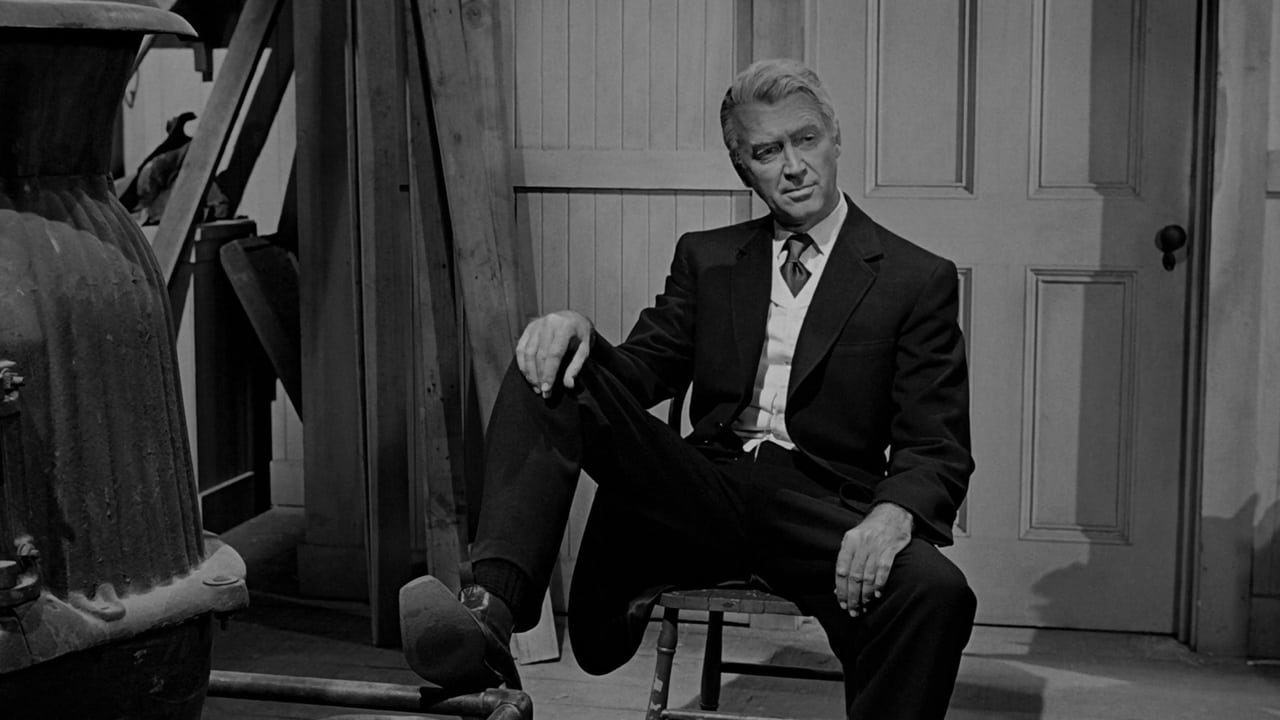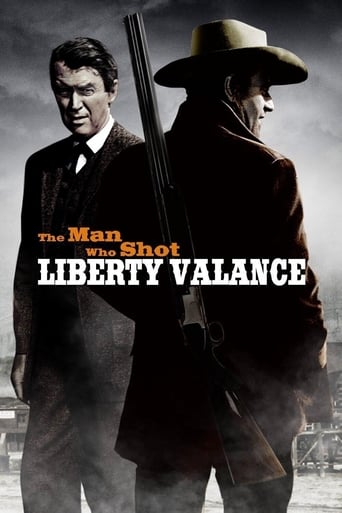GamerTab
That was an excellent one.
Solidrariol
Am I Missing Something?
Payno
I think this is a new genre that they're all sort of working their way through it and haven't got all the kinks worked out yet but it's a genre that works for me.
Marva-nova
Amazing worth wacthing. So good. Biased but well made with many good points.
theshining_1980
Indeed, as the famous quote from the movie sums it up aptly.
A meticulously written Western Drama under the genius direction of 4 time Oscar Award winning director John Ford.
Another brilliant performance from James Stewart who revives the magic of "Mr Smith Goes To Washington" as a senator with quite a story to tell and "The King of Western classics" John Wayne, who better to play the role of Tom Doniphon.
Both the Legends coming together for the first time making it unequivocally a memorable experience.
What impressed the most though, were the performances of two people which makes this movie one in a millions.
First, Edmond O'Brien, a regular in John Ford movies, as Dutton Peabody, a drunkard with an Eagle's Eye for "News" and well didn't the town of Shinbone had plethora of it, what a performance!
The Second, the heart and soul of this movie, "Liberty Valance" played by Lee Marvin, the fear and awe the character creates, sets up the movie quite beautifully.
Lastly, Vera Miles as Hallie Stoddard providing the movie, the important romantic dimension, and everything looks so complete.
It's one of those movies that stays in your memory forever. The sequence of events and scenes of the movie are so vivid even after several years.
What would you not give to see movies like this, over and over again, a true 'Masterpiece'
dblari-75736
Director John Ford was a master of subtle symbolism. Example: as Ransom leaves the newspaper office to confront Liberty, he has a gun in one hand as he pulls down the "Attorney at Law" shingle with the other hand. Equally symbolic is Ransom, after learning Liberty Valance is coming to town, erases "Education is the basis for law and order" from the blackboard. The most powerful, and yet subtle, scene was Woody Strode's character Pompey stumbling over the words "all men are created equal." Pompey says to Ransom "I knew that, but I plumb forgot it;" Ransom responds "a lot of people forget that part."
jacobs-greenwood
It was directed by John Ford, and it features a screenplay by James Warner Bellah and Willis Goldbeck that was based on the story by Dorothy M. Johnson. The titled story is told in flashback by James Stewart's character, Ransom Stoddard, who's now a United States Senator that has returned home to Shinbone to attend the funeral of his old friend Tom Doniphon, played (in flashback) by John Wayne. Woody Strode plays Tom's dependable ranch hand Pompey.While answering questions from reporters, the Senator recalls the day he met his future wife Hallie (Vera Miles), in attendance, and how he became known as "the man who shot Liberty Valance", a notorious outlaw played (in flashback) by Lee Marvin.However, once the truth is revealed - that Ransom had been an educated nonviolent man ("a fish out of water") in the untamed West, capable of standing up to the bully when it finally had to be done but incapable of stopping Valance, even after the outlaw had been drinking (it was Tom that had done the deed from a side alley, initially unbeknownst to Ransom, to protect his friend, and he had lost his girl Hallie, sympathetic to the future Senator, in the process), which was contrary to the "facts" as they were known - Carleton Young's character speaks the famous quote: "This is the west, sir. When the legend becomes fact, print the legend."The cast includes so many (Western) movie veterans that it's a virtual "who's who" of character actors: Edmond O'Brien as a newspaper editor, Andy Devine and his insufferable creaky voice, John Carradine, John Qualen, Willis Bouchey, Young, Denver Pyle, Strother Martin, and Lee Van Cleef (among others).It is incomprehensible to me that such a masterpiece as this only received one Academy Award nomination (Edith Head's B&W Costume Design was Oscar nominated)!Added to the National Film Registry in 2007.
oOoBarracuda
The Man Who Shot Liberty Valance If you think you are getting a thoughtless western when you turn on The Man Who Shot Liberty Valance, then you are dead wrong, pilgrim. This John Ford classic starring James Stewart and John Wayne brings about a very thought provoking piece to the western genre. The audience will really be challenged to evaluate what they think of right and wrong, and just how absolute the two should be. The Man Who Shot Liberty Valance begs the question, will justice always prevail? The Man Who Shot Liberty Valance opens by introducing us to an aged United States Senator as he visits his hometown to attend the funeral of a dear friend. Accompanied by his wife, the audience soon learns that there is quite a history between the deceased person and the Senator. Upon the newspaper reporters' ceaseless questioning of his arrival, the senator goes on to fill them, and the audience, in on the story involving him and the deceased man. Early on in the film a powerful scene takes place in which we meet the main character, Ransom Stoddard (James Stewart) as he is riding in a carriage. Unfortunately for Ransom, he is ambushed by a vicious gang lead by Liberty Valance (Lee Marvin). After protecting the woman accompanying him, the gang turns their violent focus on Ransom savagely beating him and leaving him for dead. Fortunately for Ransom, Tom Doniphon (John Wayne) peels him up from the path and takes him into town to have a local family tend to his wounds. When he finally comes to, Ransom is stunned, both to see the family tending to him so attentively, and to the realization that there is no accepted idea of justice in this Wild West. Ransom is committed to his belief that justice exists everywhere and as a lawyer, refuses to take arms to protect himself against Liberty Valance and his gang of outlaws. As our story progresses, Ransom stays firm in his notion of justice ruling the land. Ransom remains with the family that took him in, he even teaches the adult daughter of the family how to read and write, eventually marrying Hallie (Vera Miles) Ransom takes his teachings a step further and seeks to educate the entire town on basic principles of law and citizenship. Liberty Valance, however, remains just as committed to keeping the law out of his land and cuts Ransom off at every pass of collective improvement. Tensions rise as the boiling point is finally reached between these two culminating in a surprising shoot-out that has the audience on the edge of their seats. First of all, it needs noted that I am a sucker for a good movie told backwards. No flashbacks took place throughout the film, we are just made aware of the ending, after which the film is told in proper succession. To me, this takes a great deal of precision by a filmmaker, which John Ford is more than capable of. When this type of storytelling is properly achieved, even though the audience knows a great deal of how the story turns out, they are no less interested in how it turns. The Man Who Shot Liberty Valance is a wonderful display of backwards story telling. Another aspect that adds to the story telling of this film is the score. Each change in pitch is punctuated perfectly against the action being told on screen, bringing about a masterpiece of sensory symmetry. The sound effects were also a standout part of this film's experience. For instance, each time Liberty Valance used his weapon of choice, a whip, against his adversary, the sound was realistic enough to give the viewer a sharp sting on their back. Another mark of a great film, for me, is when action is fragmented well between what is seen and unseen. Much of this film reminded me of Burt Lancaster's first film The Killers (1946) in which the most pivotal scene climaxed out of frame proving that when a director can acknowledge the intelligence of the audience, they don't need to put every detail in front of their eyes. This scene, and many others like it, notably from Alfred Hitchcock, has stuck with me years after their initial viewing because there is great power in performing a scene off-camera. This story-telling device requires immense detail and thorough framing; once both of those criterion are met, the audience's mind is free to wonder imaging exactly what the action that took place on screen looked like. This imagination may provide even more depth to a scene than the director would have been able to film. To depict a scene this way also requires a great deal of trust in the actor. In this set-up, a director must be confident that the actor will display enough nonverbal emotion to cue the audience into what is taking place. One illustration of this device occurs when Ransom looks into the casket of his deceased friend and becomes angered that his boots have been removed. If Jimmy Stewart was less of an actor, or if John Ford was less a director, the audience would not have enjoyed such a scene, made all the more powerful by the pinnacle occurring off-camera. Another excellent device used by John Ford was the way he introduced us to John Wayne's character, Tom Doniphon. Tom acted as a savior to Ransom, and a savior is exactly how he was depicted the first time we see him, high upon his horse. One could also notice that Wayne's character first appearing on a horse correlates him to that of a knight, riding up to save the day, which he ultimately did for Ransom. Such direction by John Ford illustrates his legacy and allows the viewer to recognize, first-hand, why he remains a legend more than 40 years after his death.

